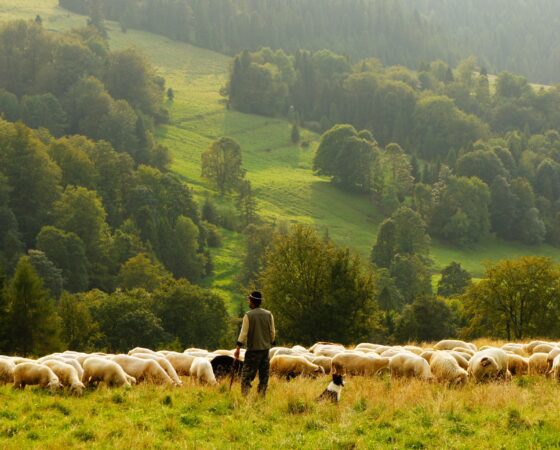Fourth Sunday of Easter | April 21, 2024 | John 10:11-18 | David H. Brooks |
Impromptu poll: when was the last time you saw a shepherd? I imagine most of you would say that the last Christmas pageant you attended would be not just the last, but probably the only time you saw (see) a shepherd. Shepherds—and the sheep that accompany them—are not a common experience for most modern people. Which means that the next poll question: which of the following activities are typical of shepherding (check all that apply) might also be a challenge, because so few of us have any real experience watching shepherds at work:
- Protecting the flock from predators;
- Preventing individual sheep from wandering away;
- Locating missing sheep;
- Leading the flock to suitable food and water.
For Jesus to say “I am the Good Shepherd” means that he is ready to address the problems of protecting and preventing, of locating and leading.
And let us admit, these are problems. For Jesus to say “I am the Shepherd,” means that there is another, unspoken sentence that says “I need a Shepherd.” The great problem in our world today is that we no longer admit or acknowledge that we need shepherding. We celebrate novelty, finding our own way, striking our own path, doing what is best for us—individually. A piece of data from a few years ago said that various versions of “My Way,” whether the Sinatra cut or someone else’s cover, was the most popular choice of funeral music in Great Britain. While I’m not sure about the data in the USA, the sentiment is surely the same: we want our final act to reflect who we are, what we’ve become. We are resistant to the idea that we should learn or mimic the behaviors and thought processes of others, and so pretend that education is entirely about helping the student discover “their truth within.” Never mind that such an approach is itself a thought process or set of educational and lifestyle habits; the deeper challenge is that we are forever in danger of wandering off and getting lost, of being unable to find food that satisfies or water that does not fail us. Jesus the Shepherd does the hard work of locating those who have wandered far, of leading those who follow his voice in a path that means peace, contentment, hope and joy, a path that does not fail or peter out or turn into a maze.
But if Jesus is the Shepherd because we need locating and leading, then Jesus is Good because we need protection and prevention.
Please understand, protection and prevention are acts of love. Now, sometimes protection and prevention mean restraint, such as when a shepherd places his body in the gap or gate when a flock is corralled for the night. But protection and prevention also means communication, such as when a cluck or a chirrup redirects a sheep’s wandering, or devotion, when a shepherd puts his body between the predator and the prey. Again, in our cultural moment we think that protection and prevention are only about restraint, about stopping someone from doing something that they want to do—and we want no part of that! But protection and prevention are about giving space for growth, for practicing the habits and patterns that make for healthy maturity. In the same way that a child closely observes a parent to learn is that a good thing to eat, or is that a good way to behave, so we listen to and observe our Lord that we might learn from his love and celebrate what is good.
There once was a little girl who, in reciting the 23rd Psalm, began “the Lord is my Shepherd, that’s all I want.” What power in such a statement! When we are in his protecting, guiding love and his locating, leading guidance, we too can say “that’s all I want.” Amen.
Pr. Dave Brooks

